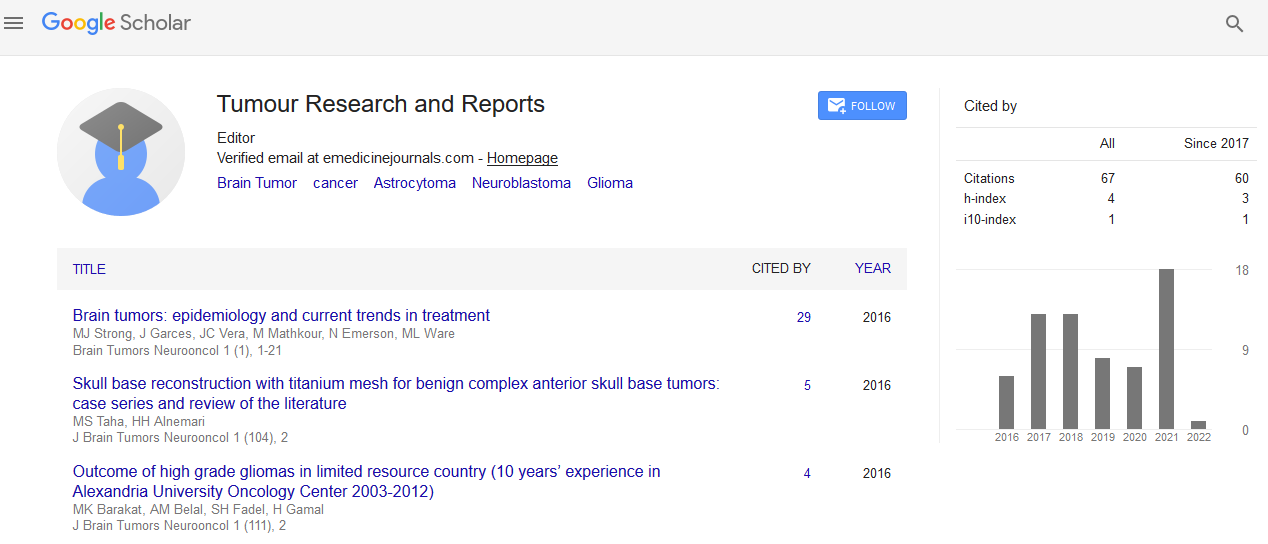Indexed In
- RefSeek
- Hamdard University
- EBSCO A-Z
- Google Scholar
Useful Links
Share This Page
Journal Flyer

Open Access Journals
- Agri and Aquaculture
- Biochemistry
- Bioinformatics & Systems Biology
- Business & Management
- Chemistry
- Clinical Sciences
- Engineering
- Food & Nutrition
- General Science
- Genetics & Molecular Biology
- Immunology & Microbiology
- Medical Sciences
- Neuroscience & Psychology
- Nursing & Health Care
- Pharmaceutical Sciences
Opinion Article - (2024) Volume 9, Issue 4
Immunotherapy for Enhanced Precision in Brain Cancer Treatment
Miguel Crnko*Received: 29-Nov-2024, Manuscript No. JTRR-24-27829; Editor assigned: 02-Dec-0024, Pre QC No. JTRR-24-27829 (PQ); Reviewed: 16-Dec-2024, QC No. JTRR-24-27829; Revised: 23-Dec-2024, Manuscript No. JTRR-24-27829 (R); Published: 30-Dec-2024, DOI: 10.35248/2684-1614.24.9.243
Description
The treatment of brain cancer has long been one of the most challenging frontiers in oncology. Traditional methods such as surgery, radiation and chemotherapy have yielded limited success in many cases, primarily due to the complex biology of brain tumors and their ability to resist conventional treatments. However, in recent years, immunotherapy has emerged as a promising alternative, offering new hope for patients with brain cancer. By using the body's immune system, immunotherapy holds the potential to provide enhanced precision in targeting and eliminating brain cancer cells, potentially transforming the landscape of treatment for this devastating disease.
Brain cancer is notoriously difficult to treat, partly because of the protective blood-brain barrier, which prevents most drugs from reaching tumors. In addition, brain tumors are often heterogeneous, meaning they consist of different types of cells with varying characteristics. This variability makes it harder to find a one-size-fits-all treatment approach. For years, the mainstays of brain cancer treatment have been surgical resection, radiotherapy and chemotherapy, each with limitations. Surgery is not always feasible due to the tumor's location, while radiation and chemotherapy can damage healthy tissue and cause debilitating side effects.
Despite these efforts, the prognosis for many patients remains grim. Glioblastoma Multiforme (GBM), one of the most aggressive forms of brain cancer, has a median survival rate of just 12 to 18 months after diagnosis, even with the most aggressive treatments. These sobering statistics highlight the urgent need for novel therapies and immunotherapy may offer the breakthrough that researchers and clinicians have been waiting for.
Immunotherapy works by stimulating the body's immune system to recognize and destroy cancer cells. Unlike traditional treatments, which directly attack tumor cells, immunotherapy leverages the power of the immune system to target and eradicate cancerous growths. Several approaches to immuno-therapy have been explored in the context of brain cancer, with promising results emerging in recent years.
One of the most exciting forms of immunotherapy is checkpoint inhibitor therapy. Checkpoint inhibitors work by blocking certain proteins that prevent immune cells from attacking tumors. For example, the PD-1/PD-L1 pathway is a mechanism that allows tumors to evade immune detection. By inhibiting this pathway, drugs like pembrolizumab and nivolumab have shown promise in treating various cancers, including brain tumors. While these treatments have had limited success in brain cancer thus far, ongoing clinical trials continue to refine their use and seek to enhance their effectiveness in brain cancer patients.
Moreover, vaccines that target specific tumor antigens are being developed to stimulate a patient’s immune system to recognize and destroy cancer cells. These personalized vaccines can be tailored to each patient's unique tumor profile, allowing for a more precise and targeted treatment. Such precision offers hope for reducing the side effects often seen in traditional therapies.
Unlike traditional therapies that treat the tumor indiscriminately, immunotherapy can be personalized based on the tumor’s genetic makeup, molecular profile and the immune system’s response. This precision could lead to more effective treatments with fewer side effects, improving the overall quality of life for brain cancer patients.
While there is still much to be done to refine these therapies and make them widely accessible, the potential for immunotherapy in brain cancer is undeniable. It represents a shift away from the “one-size-fits-all” treatment paradigm toward a more individualized approach, which could be the key to unlocking more effective and durable treatments for one of the most challenging forms of cancer.
Conclusion
Immunotherapy represents a new frontier in the treatment of brain cancer, offering the promise of enhanced precision and effectiveness in targeting tumors. While the road to widespread adoption of immunotherapy for brain cancer remains challenging, the progress made so far provides hope for patients and families affected by this devastating disease. With continued research and clinical trials, immunotherapy has the potential to revolutionize brain cancer treatment, offering new hope for improved survival and quality of life. As we continue to explore these cutting-edge therapies, it is clear that the future of brain cancer treatment is one of precision, innovation and, most importantly, hope.
Citation: Crnko M (2024). Immunotherapy for Enhanced Precision in Brain Cancer Treatment. J Tum Res Reports. 9:243.
Copyright: © 2024 Crnko M. This is an open access article distributed under the terms of the Creative Commons Attribution License, which permits unrestricted use, distribution, and reproduction in any medium, provided the original author and source are credited.

